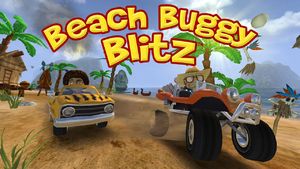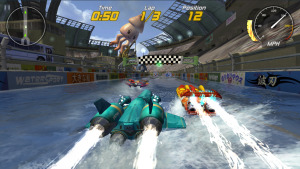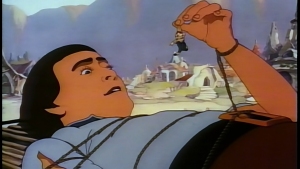 This last week we traveled allllll the way down to San Francisco to attend Google I/O as part of the Developer Sandbox.
This last week we traveled allllll the way down to San Francisco to attend Google I/O as part of the Developer Sandbox.
The main reason for going was to show off our new game, Beach Buggy Blitz ... which we did to every poor sucker who walked by within arm's length of our kiosk and didn't run away screaming when we shoved our preloaded Nexus 7's into their face.
Actually, OK, it was a bit more relaxed than that. We had a great time meeting fellow Android nerds, and people seemed to really enjoy the game, which was gratifying because we haven't shown it to many people outside our little circle.
We had the Sandbox kiosk on Thursday, and on Wednesday and Friday we got to wander around, explore, check out some exhbits, and just soak up the Android love.
Along the way we saw some things we really liked, and here in no particular order, are our top 10:
1. Nexus 7
Um... a 7" Tegra 3 tablet, kept eternally up to date with the latest pure Android experience starting with the as-yet-unreleased Jellybean...for $199? Yes, please. Sure you could quibble about not having a back-facing camera or HDMI out or whatever, but...for the love of pete it's $199! This is the new ultimate portable gaming device.
2. Jellybean and Project Butter
Jellybean is Android OS 4.1, and it's slick. It's especially slick because of "Project Butter", Google's effort to smooth out the UI in Android. Anyone who's compared an iPad and Android tablet side by side knows what I'm talking about. And thanks to their efforts Jellybean on a Tegra 3 at least is smooooooth as silk, and there are a lot of other new features we like as well.
3. The giant Nexus Q ball
I never quite figured out what this thing did, but it was big and robotic and it played cool music.
4. Cube 3D printer
At $1299 it's not cheap, but the Cube is the first consumer-level 3D printer that I've ever seen that actually looks like it does what you want. We were super impressed with the quality of the detail and the durability of the materials. It really is kind of like magic. Slow magic, but still...magic.
5. Beach Buggy Blitz!
Yeah OK I know this is self serving, but it's my list dammit. And yeah we were super happy to finally be able to show the game to people and talk to them about it and it didn't crash or do anything weird, and so I think it's fair to say it was the highlight of the show for us at least :-)
6. That guy with the helicopter
Dammit, I didn't get a video of this guy, but on Thursday afternoon this RC helicopter champion gave a demonstration in front of a massive crowd that was completely insane. He flew that thing upside down, sideways, and within inches of the ceiling and floor. Really, he distorted physical reality. It was loco.
7. Visual Studio development plugins for Android and Chrome Native Client
This is actually Ralf's favorite thing. NVIDIA is releasing a plugin that allows direct building and debugging of Android apps from within Visual Studio. And Google is releasing one for Chrome Native Client. This is going to make developing and debugging Android and Chrome apps a lot smoother!
8. 10 Things Every Android Game Developer Should Know
This talk on Friday morning by Daniel Galpin and Ian Lewis focused on what NOT to do to NOT get featured....or NOT NOT get featured. Or something. Anyway it was really informative, and surprisingly entertaining and funny to boot. I don't know if they'll post it online, but if they do and you ever think about making Android games you should watch it.
9. Skydivers with Glass
By now pretty much everybody's seen this, or at least heard about it. And even though I'm not totally sold on wearing a plastic toothbrush with a camera on it next to my face, the demo was pretty incredible. Hats of to Google for coordiating a live demo like that which could have gone wrong in so many ways...and didn't.
10. Free Stuff!
Nexus 7, Nexus Q, Galaxy Nexus phone, Chromebox. Plus T-shirts, little pins and stickers, free food and booze and music and entertainment. OK well I guess it's not technically free if you bought your ticket, but it's still pretty awesome considering that most conferences don't give you anything except tired feet.
Thanks again, Google! See you next year (I hope!)










